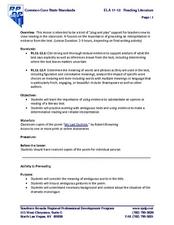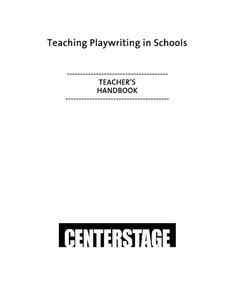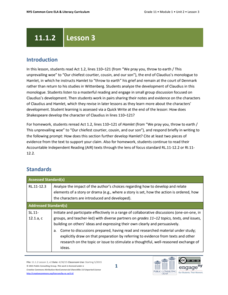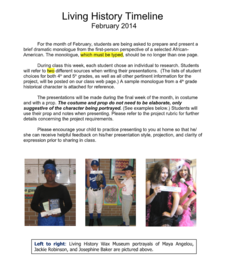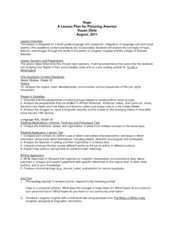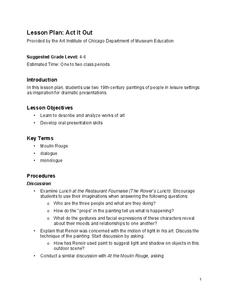Captioned Media
Creating Dramatic Monologues from The Grapes of Wrath
Set in Oklahoma in the 1930s, The Grapes of Wrath presents a powerful view of life during the Great Depression. An insightful lesson plan takes a closer look at the characters in John Steinbeck's classic novel, combining the...
National Endowment for the Humanities
Dramatic Perspective in Moby Dick
A lesson on Herman Melville's Moby Dick asks readers to compare the first person point of view of Ishmael in Chapter 1 to Captain Ahab's dramatic monologue in Chapter 37. Readers cite evidence from the chapters to support their...
Southern Nevada Regional Professional Development Program
Reading Literature - My Last Dutchess
Draw back the curtain, add a spot of joy to your class, and let learners be lesson planed by a close reading exercise that models how to develop an interpretation based on evidence drawn from a text. Robert Browning’s dramatic monologue...
EngageNY
Grade 11 ELA Module 1: Unit 2, Lesson 4
How does a soliloquy differ from a monologue? Scholars read the first soliloquy from Shakespeare's Hamlet and compare it to Claudius's monologue. They also engage in a group discussion about Hamlet's character development.
Alabama Learning Exchange
J. Alfred Hyperbolizes
Mermaids will sing to your class members as they engage in an activity related to T.S. Eliot's famous dramatic interior monologue. After engaging in a socratic seminar about literary devices in the poem, individuals choose one...
EngageNY
Grade 11 ELA Module 1: Unit 2, Lesson 2
What tools did Shakespeare use to develop his characters in the play Hamlet? With the resource, pupils engage in a discussion about how the character Claudius introduces and develops Hamlet. They explain how word choices in Claudius's...
Penguin Books
A Teacher's Guide to the Signet Classic Edition of William Shakespeare's The Taming of the Shrew
A study of The Taming of the Shrew proves to be problematic in contemporary classrooms. Is Shakespeare following Elizabethan conventions or being ironic? What are readers supposed to make of all the hunting imagery? Of Katherine's...
EngageNY
Grade 11 ELA Module 1: Unit 2, Lesson 12
How does Shakespeare develop the main ideas in Hamlet? Using the resource, scholars continue analyzing the famous monologue from the play. They identify a central idea from the passage and write to explain how it relates to other central...
Houghton Mifflin Harcourt
American Stories: Challenge Activities (Theme 2)
For those class members who have mastered the basic concepts and need extra challenges, here's a packet of activities sure to engage them in stories about American immigration and exploration. Kids may design a dramatic...
Learning to Give
Teaching Playwriting in Schools
The world is a stage, and so is your classroom! Hone the skills of the next generation of Tony® award winners with a set of exercises, reference pages, writing prompts, and excerpts from famous plays.
EngageNY
Grade 11 ELA Module 1: Unit 2, Lesson 3
How does Shakespeare develop the character of Claudius in the first Act of Hamlet? Using a helpful resource, pupils complete a Quick Write to answer the question. Readers also work in small groups to discuss the characters of Claudius...
Brockman Elementary School
Living History Timeline
As part of a living history research project, learners research a chosen historical figure that they will study and physically represent in a gallery walk. This resource includes a project description, letter to parents,...
Curated OER
Picturing America: Images and Words of Hope from Romare Bearden and Langston Hughes
A carefully crafted three-day lesson integrates poetry and visual art. By analyzing and comparing Langston Hughes' poem "Mother and Son" and Romare Bearden's collage "The Dove," readers explore the theme of hope. The lesson activates...
Art Institute of Chicago
Act It Out
Examine two works of art and use these pieces as inspiration for dialogues. The whole class discusses Renoir's Lunch at the Restaurant Fournaise and Toulouse-Lautrec's At the Moulin Rouge. Then, in groups of either three or ten, pupils...




